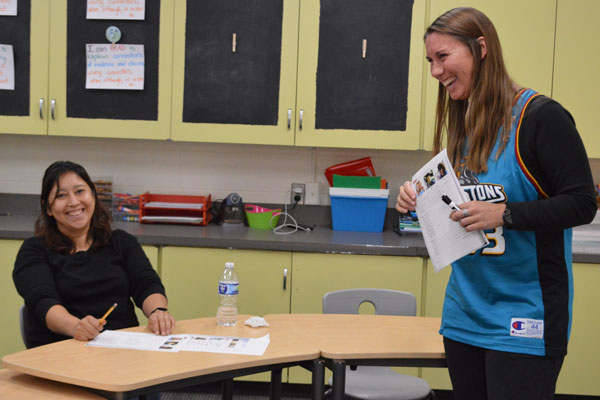Kentwood — Inside a Glenwood Elementary School classroom, several Afghan women pointed to pictures on the white board and identified them: “Sandwich.” “Sun.” ‘Window.” “Man.”
They were catching on quickly during a beginner English as a Second Language session offered by Literacy Center of West Michigan. They also spent time passing around a beach ball, each saying their names while holding the ball, then asking, “What is your name?” before bouncing it along to someone else.
The women, who did not want to be identified or photographed, are among 20 adults attending two-hour, twice-weekly classes planned for the entire school year to help non-native English speakers learn to speak and read English.
The center plans to add a morning class to accommodate a waiting list of 12 adults, said Laura Avalos, coordinator for the Literacy Center. Many participants have children in the district.
It is the first year the Literacy Center has offered the course in Kentwood. It is also offered at several sites in Grand Rapids Public Schools, Godfrey-Lee and Godwin Heights. Virtual classes are also available.
“We help them with their English to help them get better at helping their kids while they are in school with their teacher conferences and homework. It’s getting them involved with the schools as much as we can,” Avalos said.
Many parents – some who have never attended school themselves – make huge progress over the course of the classes, Avalos said. They receive a 40-hour certificate at the end.
Helping Themselves & their Families
Kentwood, the most diverse district in Michigan, is home to students from dozens of countries speaking 80 different languages. Learning English equips parents with the ability to communicate with teachers, staff members, help children with homework and understand what’s going on in their classrooms.
Sanela Sprecic, EL Program director for the district, said she thinks about the courage and resilience of immigrants and refugees coming to the U.S. Working to learn English is another way for them to help themselves and their families. School is a safe place for them to do that.
“They trust us with their children, but they also look up to us as sources to help them help their kids,” she said.
Learning English also opens doors for them, Sprecic said. “Language is access. We are helping them to get better access to education for their students.”
Also, she said, immigrant parents who learn English have more tools to connect with their children long-term. Students typically learn English quickly, but don’t keep up with their native language at the same pace. This can eventually create a communication gap between parents and students.
Participant Sharhonitzitziki Gonzalez said she wants to improve her English so she can be more aware of what her two children are doing in school.
“I want to speak and write and have very good communication,” said Gonzalez, whose first language is Spanish. Her children attend Kelloggsville Middle School and High School.
Seated next to her, Miguel Villegas also is working to become fluent in English after 35 years in the U.S.
Originally from Mexico, he wants to talk more to people at church and at work, and to his niece, who attends Wyoming High School. “I want to speak and write better English,” he said. “I am trying.”
Other parents came from Rwanda, Vietnam, Mexico and Sudan.
Along with English classes, the Literacy Center offers career-focused certified nursing assistant, construction and pharmacy technician programs. They also offer citizenship classes.
‘Language is access. We are helping them to get better access to education for their students.’
– Sanela Sprecic, Kentwood Public Schools EL Program director
Wendy Falb, executive director of the center, said the program is unique in providing a certified instructor and childcare. The curriculum is designed to focus on parent and school needs and requests. The staff hosts two Family Activity Nights per semester in conjunction with the ESL classes. Falb and staff take pride in the number of parents they reach, many who have had no formal schooling.
“While we have been delivering these classes for almost 15 years it is in the last two years that we have been using professional level instructors and the quality and consistency of the programming has skyrocketed. At this point we are one of the most robust Family Literacy Programs in the country and certainly the state,” Falb said.













